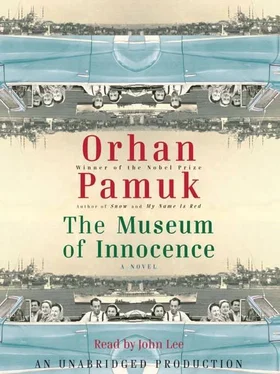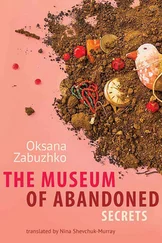If I held myself back, kept myself from touching her (as I was becoming a master at doing), Füsun would come even closer; she might brush against me, and perhaps she would say a few sweet things. Or (as she had a few days earlier) she might ask, “Is something bothering you?” In fact, that evening Füsun said, “I love how quiet it is at night. I love watching the cats wandering over the roofs.” And again I would be gored by the same painful dilemma. Could I touch her, hold her, kiss her? How I longed to do so. It is possible that during the first weeks, the first months (as I would come to believe afterward, for many years) that she was making no kind of overture at all, but only saying the polite and civilized things that an intelligent, well-mannered girl with a high school diploma was obliged to say to a distant relation who was rich and lovelorn.
During those eight years the dilemma preoccupied me, and damned me. The view you can see in the picture displayed here is the one we beheld standing at the window for at most two or two and a half minutes. I would like the museum visitor in contemplating it to please reflect on my dilemma as he looks at this view, bearing in mind, too, how delicate and refined was Füsun’s behavior at this moment.
“I find this view so beautiful, because you are at my side,” I finally said.
“Let’s go, my parents will begin to wonder what we’re up to.”
“With you at my side, I could be happy looking at a view like this for years,” I said.
“Your food is getting cold,” said Füsun, and she went back to the table.
She knew how cold her words were. For it was not long after I had returned to the table that Füsun stopped frowning, giving me two sweet, compassionate smiles as she passed me the saltshaker (later to be added to my collection) and allowing her fingers to brush rather boldly against my hand; with that she made everything right again.
ON FIRST discovering that his daughter had entered a beauty contest with the support and approval of her mother, Tarık Bey had been beside himself with fury, but loving his daughter dearly as he did, he could not resist her supplications when she burst into tears; afterward, though, when he heard what people said about her, he would regret tolerating the disgrace. There had been beauty contests during the first years of the Republic during Atatürk’s reign, and when girls walked down the catwalk in black swimsuits, they were, in Tarık Bey’s view, both manifesting their interest in Turkish history and culture, and also showing the entire world how modern they were, which was all to the good. But by the seventies, the contests had become the province of girls with no culture or manners and coarse hopes of becoming singers and models, and so the significance of beauty contests became something else altogether. The hosts of the old contests would ask the contestants, oh so politely, what sort of man they dreamed of marrying, as a refined way of clarifying that the girls were virgins. And while today’s hosts asked girls, “What do you look for in a man?” (the correct answer being “character”), they would grin and smirk like Hakan Serinkan. So Tarık Bey was adamant with his filmmaker son-in-law that while he and Füsun were living under his roof, his daughter was to have no further adventures of this nature.
Out of fear that her father might consider becoming a film star likewise objectionable and thwart her plans in various overt and covert ways, we continued to discuss the “art film” Feridun planned only in hushed tones. In my view, Tarık Bey pretended not to hear our whispering because he looked favorably on my interest in his family and enjoyed drinking and talking with me. And as the art film provided a plausible pretext for my visiting the Keskin family four times a week, it served only too well to conceal the real purpose of my appearances, so well known to Aunt Nesibe. During the first few months, whenever I looked at Feridun’s sweet and guileless face, it seemed to me that he knew nothing, but later I would begin to think that he was in on a counter plot, but trusted me with his wife, seeing me as no kind of threat-indeed someone to be made fun of behind my back-and in his desperate need for my backing, simply played along with the deception.
Toward the end of November, after much coaxing from Füsun, Feridun finished the final draft of his screenplay, and one evening after supper, while standing on the landing at the top of the stairs, and under Füsun’s frowning gaze, he ceremoniously handed the typescript over to me, as prospective producer, to solicit my decision.
“Kemal, I want you to read this carefully,” said Füsun. “I believe in this screenplay and I trust you. Don’t let me down.”
“I’d never let you down, my dear girl!” I pointed at the typescript in my hand. “Tell me, do you esteem the screenplay so highly because you’re meant to star in it, or is it because it’s meant to be an ‘art film’?” (A new concept in 1970s Turkey.)
“Both.”
“Then consider the film made.”
The screenplay was entitled Blue Rain , and there was nothing in it remotely to suggest an awareness of Füsun, or me, or our romance, or our story. Over the summer I had come to have respect for Feridun’s intelligence and his understanding of film; discussing cultivated and highly educated Turkish filmmakers longing to make art films in the manner of the West, he had very astutely identified their typical mistakes (imitation, artificiality, moralism, vulgarity, melodrama, and commercial populism, etc.), so why had he fallen into all the same traps? As I was reading this vexing screenplay, I realized that the longing for art, like the longing for love, is a malady that blinds us, and makes us forget the things we already know, obscuring reality. Even the three scenes, motivated by commercial considerations, in which Füsun’s character would appear nude (once making love, once pensively smoking a cigarette in a bubble bath, in the style of the French New Wave, and once wandering through a heavenly garden in a dream) were arty, insipid, and gratuitous!
My confidence in this project was never more than a pose, but after reading these scenes I was even more resolutely and angrily opposed than Tarık Bey would have been. But realizing that I had to keep the project alive for a while longer, I lavishly praised the script to both Füsun and her husband, going so far as to tell them that “as the producer” I was now ready to begin tryouts for actors and technicians, a zealousness for which I gently mocked myself, in the interest of making it more credible.
So with the onset of winter, Feridun, Füsun, and I delayed not a moment in visiting the backstreet haunts, the prospective production offices, and the coffeehouses where second-class actors, would-be film stars, bit players, and set workers played cards, as well as the bars where producers, directors, and semifamous actors were usually to be found from early evening, eating and drinking until the late hours. All these places were a ten-minute walk up the hill, and whenever I took this route I would remember how Aunt Nesibe had told me that Feridun had married Füsun in order to live within walking distance of such establishments. Some evenings I would collect them at the door, and some evenings we three-Feridun, with Füsun on his arm, and I-would walk together up to Beyoğlu, having had our supper with her parents.
Our most frequent destination was the Pelür Bar, popular with film stars and men with new money hoping to mingle with girls who hoped to become starlets, and the children of Anatolian landowners, now cast into the Istanbul business world by day and letting off steam in the evening, and moderately renowned journalists, film critics, and gossip columnists. All winter long we met many actors who’d played supporting roles in the films we’d seen that summer (including that mustached friend of Feridun’s who had played the crooked accountant), and we became part of that society of spirited, bitter, but ever hopeful souls who whiled away the evenings exchanging vicious gossip, recounting their life stories, and describing their ideas for films, and who couldn’t get through a day without the company of those like them.
Читать дальше












